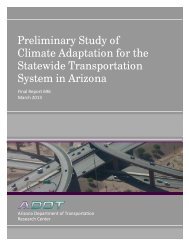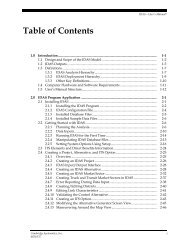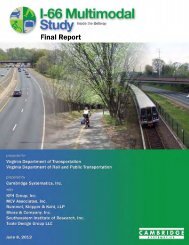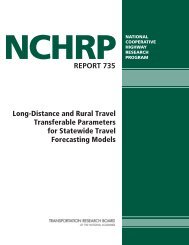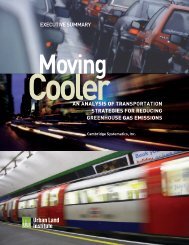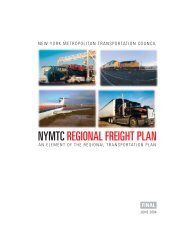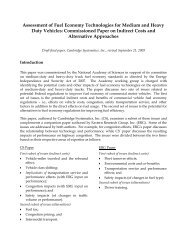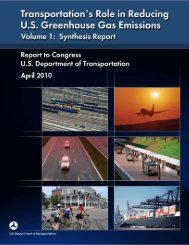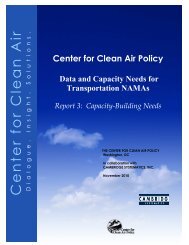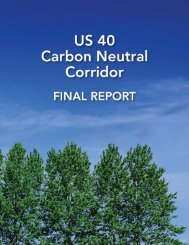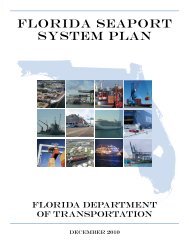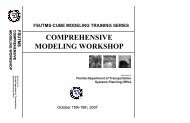addressing climate change adaptation in regional transportation plans
addressing climate change adaptation in regional transportation plans
addressing climate change adaptation in regional transportation plans
You also want an ePaper? Increase the reach of your titles
YUMPU automatically turns print PDFs into web optimized ePapers that Google loves.
State-of-the-Practice Climate Change Adaptation Activities for California MPOs and RTPAsAppendixPrepar<strong>in</strong>g for the Chang<strong>in</strong>g Climate: a Northeast-Focused NeedsAssessmentThis effort provides a “snapshot” of an entire region - from Ma<strong>in</strong>e to NewJersey – of what actions agencies are tak<strong>in</strong>g to prepare for <strong>climate</strong> <strong>change</strong> on thelocal, state, and <strong>regional</strong> levels. Methods used <strong>in</strong>clude <strong>in</strong>terviews andquestionnaires adm<strong>in</strong>istered to over 200 communities.Responses were received from 34 local governments, six <strong>regional</strong> governments,and four state governments. The largest concerns among these respondents arerelated to sea level rise, more precipitation and floodpla<strong>in</strong> <strong>change</strong>s, and publichealth. Many communities need technical assistance do<strong>in</strong>g <strong>in</strong>frastructurevulnerability assessments. Other needs <strong>in</strong>clude <strong>climate</strong> impact assessments, local<strong>climate</strong> data maps that project sea-level rise, and updated floodpla<strong>in</strong> maps.Additional needs relate to outreach; many expressed a need to helpcommunicate the message that <strong>climate</strong> <strong>change</strong> is happen<strong>in</strong>g. They wanted toknow how to make the <strong>climate</strong> <strong>change</strong> actions a priority dur<strong>in</strong>g f<strong>in</strong>ancial hardtimes. Given these f<strong>in</strong>ancial hard times, resources and staff to dedicate to thistopic are difficult so a common approach is to ask all departments to put a“<strong>climate</strong> lens” on their projects. Alternatively, hir<strong>in</strong>g an outside consultant with<strong>climate</strong> <strong>change</strong> expertise would take the pressure of extra tasks off <strong>in</strong>ternal staff.Atlantic Canada Climate Change Adaptation StrategyIn 2008, the New Brunswick Department of the Environment and NaturalResources Canada (NRCan) hosted a workshop on <strong>climate</strong> <strong>change</strong> <strong>adaptation</strong> forthe governments <strong>in</strong> Atlantic Canada. The product that emerged was a <strong>regional</strong><strong>adaptation</strong> strategy with a focus on improv<strong>in</strong>g adaptability and resilience <strong>in</strong> theregion, <strong>in</strong>corporat<strong>in</strong>g <strong>adaptation</strong> <strong>in</strong>to new and exist<strong>in</strong>g <strong>plans</strong>, and creat<strong>in</strong>g a<strong>regional</strong> collaboration framework.The prov<strong>in</strong>cial governments of Atlantic Canada used a workshop format todiscuss their priorities and goals with regard to <strong>climate</strong> <strong>change</strong> <strong>adaptation</strong>.Three priorities were central to this event: coastal areas, <strong>in</strong>land waters, and<strong>in</strong>frastructure. The follow<strong>in</strong>g three objectives were the outcome of theworkshop:1. Improve the region’s resiliency and adaptability;2. Incorporate <strong>adaptation</strong> <strong>in</strong>to new and exist<strong>in</strong>g <strong>plans</strong>; and3. Create a framework for <strong>regional</strong> collaboration.The Atlantic Canada Climate Change Adaptation Strategy was created at theworkshop. The Atlantic Climate Adaptation Solutions (ACASA), the partnershipamong governments from the Atlantic prov<strong>in</strong>ces of Canada, then applied for andwere awarded a grant from NRCan. Work was scheduled to start <strong>in</strong> early 2010with a completion date <strong>in</strong> December 2012. The grant specified that the recipientsmust address <strong>climate</strong> <strong>change</strong> impacts affect<strong>in</strong>g the region, with a focus onB-10 Cambridge Systematics, Inc.



